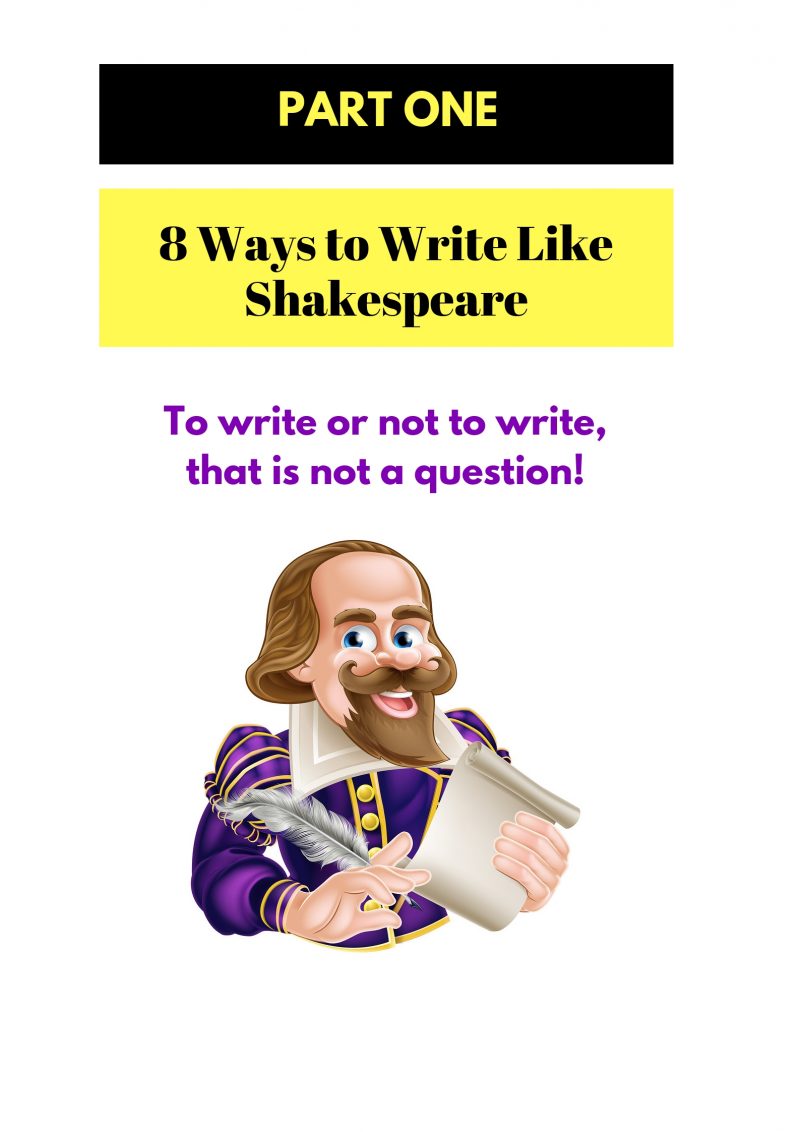I learn something new in every article or book I write, but perhaps never as much as I learned while composing my book The Bard and the Bible: A Shakespeare Devotional, a book of daily reflections drawn from a quote from Shakespeare and a verse from the King James Bible. Even after more than forty books, hundreds of articles, and thousands of blog posts, I learned from the Bard of Avon at least eight crucial and valuable lessons:
- Study thy craft.
No one knows when Shakespeare started writing poems and plays, but he probably learned stagecraft and playwriting from the likes of John Lyly, Thomas Kyd, and Christopher “Kit” Marlowe—the best of his day—while trodding the boards as a young apprentice.
So how are you studying your craft? If you don’t read voraciously in your genre, pick another genre. If your grammar needs work, take a class or read a book. Subscribe to Writer’s Digest. Absorb The Elements of Style, On Writing Well, Stephen King’s On Writing, Annie Dillard’s The Writing Life, and everything else you can find about the craft of writing. Read blogs like this one. Make writers conferences a part of your growth strategy. Enlist a good critique partner.
- Know thy audience.
Shakespeare knew exactly who would be in the audience, from the “groundlings” to the nobility, and injected specific elements into his writing for each part of his audience. He may even have revised his plays when they were presented at court (as opposed to in the countryside or theaters).
What is true of his plays is also true of his poetry. Many of his sonnets, for example, were clearly written for a specific person in a specific situation. So be that specific in identifying and writing for your audience. You can’t and you shouldn’t write for everyone. You need a target to shoot at, an audience to play off, a clear picture of who your reader is for any given project.
- Take the time to find the best word.
Do not dip your pen in an inkwell of ordinary language. Take the time and trouble to find the best words, as Shakespeare did in one of his most justifiably famous scenes, as the dying nobleman John of Gaunt describes his homeland:
This royal throne of kings, this scepter’d isle,
This earth of majesty, this seat of Mars,
This other Eden, demi-paradise,
This fortress built by Nature for herself
Against infection and the hand of war,
This happy breed of men, this little world,
This precious stone set in the silver sea,
Which serves it in the office of a wall,
Or as a moat defensive to a house,
Against the envy of less happier lands,
This blessed plot, this earth, this realm, this England
(Richard II, II, 1).
You have tools Shakespeare lacked: a thesaurus and Google and probably a larger library than the Bard, who never owned more than a hundred books in his life. So take the time to find the word that best expresses what you want to say.
- Find thy funny bone.
Shakespeare’s reputation was made on his early histories, the tales of kings and wars and death and succession. But he would not have done so well if he had neglected the funny bone and never created Falstaff, the fat knight, or Mistress Quickly, the innkeeper.
In fact, you could say that Shakespeare invented both the stage musical and the romantic comedy. He used humor everywhere in his plays. He wrote scenes for specific company “clowns,” writing to their particular talents. He even inserted comic relief into his darkest tragedies, like Macbeth and Hamlet.
“But I’m no comedian,” you might say. You don’t have to be. Start with what makes you smile or chuckle. Use surprise, exaggeration, and unlikely combinations. You don’t have to get readers to laugh out loud, but lighten things up occasionally. And remember that humor always works best when it has an element of truth.
(to be continued)



 Author Profiling
Author Profiling

Oh Bob, thy winsome words simpered my countenance. I laud thee for this sage stew of enlightenment, shrewdly stirred with thy funny bone.
I can no other answer make but thanks,
And thanks; and ever thanks.
Finding the best word is not only necessary; it’s fun. However, I would recommend using Bing instead of Google for the search engine. It brings up the most useful list of synonyms, which is really what you want to get both variety and accuracy when trying to avoid using the same word too often.
I type “definition” followed by a word into Bing to get exact definitions, synonyms, and word origin info (very helpful for checking whether a word existed at the time of your historical). I always click the link at the bottom of the box for more definitions because the precise meaning I want and the link to the perfect synonym might only display in the expanded info.
Great tip, Carol. Thanks!
Bob, I enjoyed this post, and learned a few things about Shakespeare in the reading. Finding the best word . . . it’s taking the time to do this that makes a manuscript shine.
Verily.
How do I love thy posts?
Let me count the ways… (apologies to the bard for insinuating another poet)
Bob, I love your sense of humor and your sense of proportion and your wisdom and your common sense. Please don’t ever change. Only grow more so.
I’m growing more so, all right. 🙂
I thanksest thou for thine postings which inspirest me to doeth my best. Bless you, my friend. I doest love thy sense of humor.
Yes, verily and in truth.
Bob, to write like that immortal bard
who is my literary hero, to choose the words,
make muscular the art that comes so hard
to my pen and mind, where his so gracefully fords
the rapids and eddies of fast waters that guard
the borders of a land of craft, a pace that hoards
acclaim, spent sparingly, immune to my petard
of callow enthusiasm, immune even to the Lord’s
name used on my behalf (but write the prayer card,
please, maybe today the gatekeeper’s view is blurred…)
The hill’s so steep, but there’s comfort with the stinging lash;
of abject failure, when my works are duly rated trash.
I can match his hirsute splendour, with Vandyke beard and curvy ‘stash.
bwaaahaaaaa
you blow us out of the lordly contest for the conquest of words…
pffft
Claire, I do have fun.
And I bet you have the ‘stash and beard to go with it.
Claire, I did, and will again. Gets a bit hot in summertime New Mexico.
Have to say that since I’m Asian, it was more a Fu Manchu thing.
I think there’s a song about you…
If there isn’t, YOU write it Claire. I charge you with this duty.
I have learned that my illness is my strength, and that the hopeless future highlights the hope that is in Christ.
To live is Christ; to die is gain.
I would not have missed this for the world.
…I can see some of the words now…but I’m not a good songwriter, so someone, please, write this guy a song!!
It is one of my favorite country songs.
‘I went 2.7 seconds on a bull named Fu Manchu’
I believe our lives are those 2.7 seconds, and sometimes Fu Manchu is a tough (sorry) SOB but it reminds us that we need to live like we are in fact dying. God is with us urging us on to sky dive, to get close to Him, to ride the bull (and hit the ground time and again), and make that difference, even if it’s shortened by our very fallen world.
See, Andrew, you school me. I always thought “hirsute” was a reference to a lady’s outfit.
😀
Andrew, great to see you here today. Love your sonnet and sense of humor.
Thank you so much, Judith!
…
I figured it was a genetic disorder in which there was just too much hair and never applied it to the norm of Duck Dynasty. Or perchance, you.
Claire, I can’t tell you how much I wanted to have the Duck Dynasty look! But genetics simply won’t allow it.
another bwaaahhhhaaaaaaa…
my son has the duck dynasty look beat. Right now he looks more like a terrorist than a DD guy. He has Jewish genetics from me and my ex, so he looks rather the part.
For his birthday tomorrow he is lucky he is travelling out of town.
you have no idea how I have plotted and planned to sneak into his house to scissors it off.
Rats. I will have to wait for Thanksgiving or Christmas.
Bob,
Loved this and looking forward to the rest. As for finding a funny bone, it took me awhile, until I realized I was trying to force it. Hah! One day I started writing and my characters began joking back and forth and I found myself giggling, wondering how on earth this was happening—because I don’t consider myself that funny. I suppose the moral here is: Really get to know your characters because they will always have a great time if they are familiar with each other.
My characters did the same, took over a comedic scene (okay, several) and I have NO funny bone. Allowing the funny bone to rule completely is over the top (unless you are writing pure comedy like the long since passed Erma Bombeck).
Claire, I think you are indeed funny. You’ve made me chuckle several occasions on this blog. Not sure if anything can be “over the top,” since we tend to under-do things sometimes… 😉 Of course, if we aren’t used to being funny, then it can certainly feel “over the top.” Why not let the laughs go on for at least an entire scene or a page? 😀 I try to do a variation of that, especially after my characters have experienced an emotional scene…
Aw, thank you Tisha. I have an ‘over-the-top’ modern noir in a man’s 1940’s voice that the rest of the characters don’t seem to care/recognize. He’s quite a morose pathologist, cynical in the same town of my first novel.
“I still mulled over how I’d been shot.” It goes on, but you get the idea. And it to me, is humorous. Some say I’ve nailed the genre while others say it’s dumb.
I just lifted a shoulder! An action I overdo in my work! How would Shakespeare deal with this? Or my noir character? The latter would grab the gin and salami he hides in his desk. Lunch of choice.
Claire, I agree with Tisha; you are indeed funny, in the understated and sly way that I love the most.
You mean, slapstick and puns. Right?
I am not above either.
Hey, slapstick and puns are great. Jerry Lewis and Dean Martin had a whole bevy of them!
I still secretly giggle at these guys & the old videos… I used to watch the reruns (or new ones) with my folks when I was very young. Johnny Carson, too. Carnac the Magnificent.
Bob,
Great post. I have developed an excel worksheet with repetitive words and possible changes. Much of this came as wisdom from an agent who is honest and yet encouraging.
The worksheet grows, and it’s fun to use.
Who doesn’t love Shakespeare? He has the title of ‘the bard’ for a reason.
Thou hast arrows that fly true, piercing even to the marrow of my excel sheet.
I must flee to the … thesaurus.
But soft, what wisdom through yonder browser breaks?
Tis the blog, and Bob is the source.
Can’t wait to read the next installment!